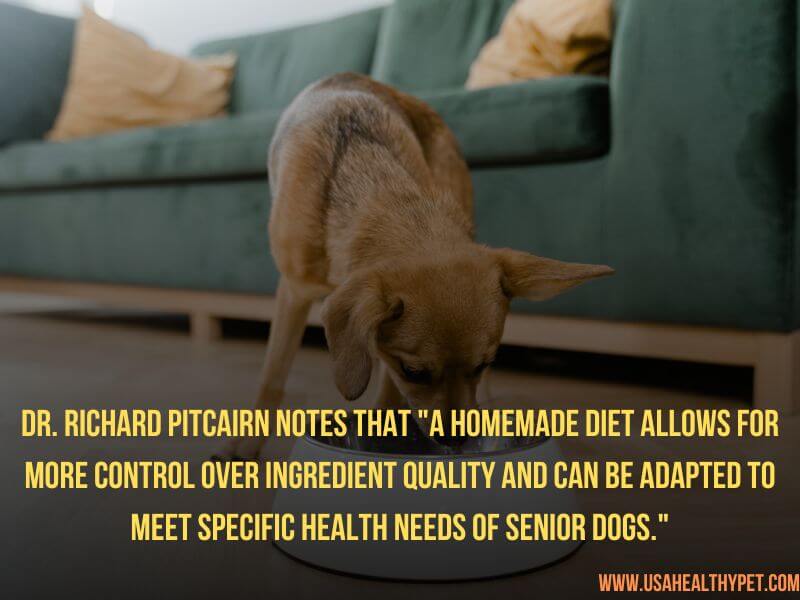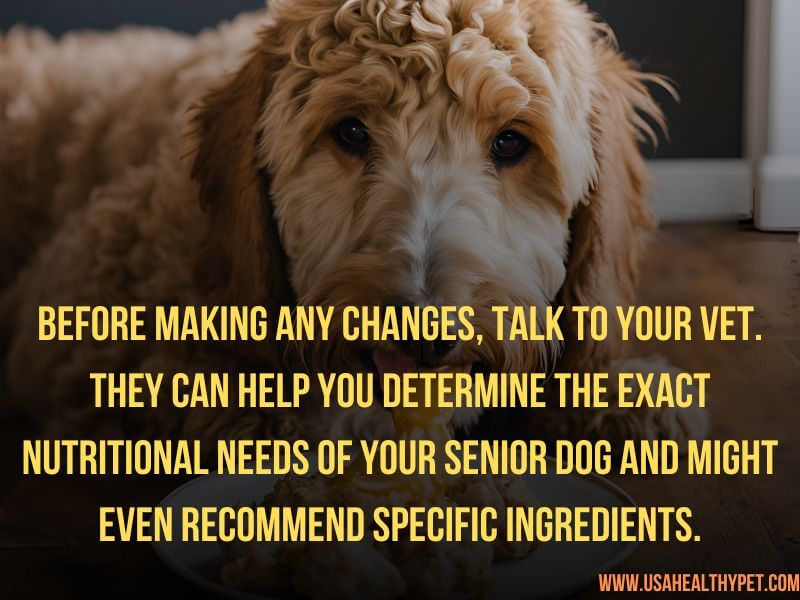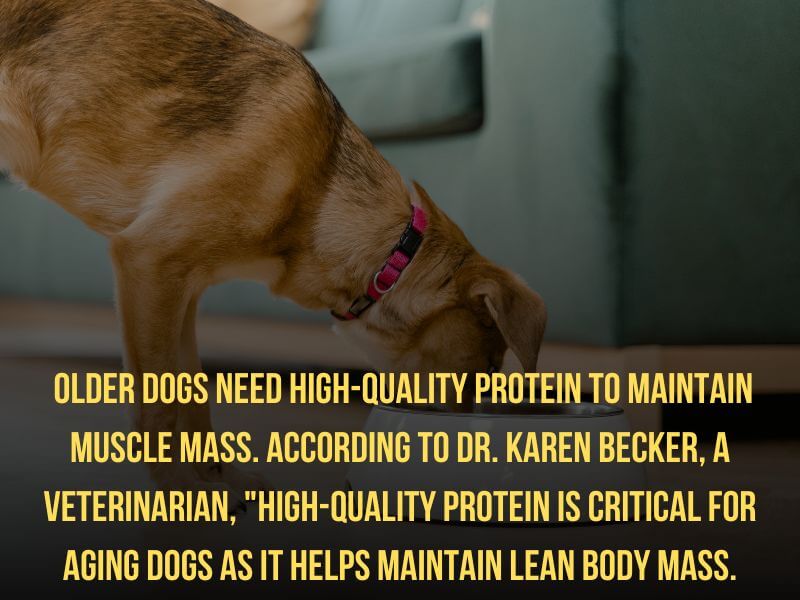As our furry friends get older, their nutritional needs change like ours. If you want to ensure your senior dog is eating the best possible diet to keep them healthy, and full of energy.
Let’s dive into what makes a great homemade diet for senior dogs and how you can make delicious, nutritious meals in your own kitchen.
Understanding Your Senior Dog’s Nutritional Needs
Why Diet Changes Are Necessary
When dogs age, their metabolism slows down, and they become less active. This means they need fewer calories but more of certain nutrients to maintain their health.
Key Nutrients for Senior Dogs
- Protein: Older dogs need high-quality protein to maintain muscle mass. According to Dr. Karen Becker, a veterinarian, “High-quality protein is critical for aging dogs as it helps maintain lean body mass.”
- Omega-3 Fatty Acids: Great for joint health and reducing inflammation.
- Antioxidants: Support their immune system. A study published in the Journal of Veterinary Internal Medicine found that antioxidants can enhance the immune response in older dogs.
- Fiber: Helps with digestion and keeps their gut healthy. Dr. Jennifer Coates, a veterinary advisor for PetMD, says “Adequate fiber in the diet can help prevent constipation, which is a common issue in older dogs.”
- Calcium and Phosphorus: Important for bone health.

Key Ingredients for a Balanced Homemade Diet
Here are the essential ingredients you’ll need:
- Lean Proteins: Chicken, turkey, lean beef, or fish. Protein is crucial for maintaining muscle mass.
- Healthy Carbs: Sweet potatoes, brown rice, or quinoa. These provide energy without packing on the pounds.
- Veggies: Carrots, green beans, and spinach. They’re packed with vitamins and minerals.
- Fruits: Blueberries, apples (without seeds), and bananas. These are great for a little natural sweetness and extra nutrients.
- Supplements: Omega-3 fatty acids (fish oil), glucosamine, and chondroitin. These support joint health and overall well-being.
Homemade Diet Basics
Why Choose Homemade?
Homemade diets can be tailored specifically to your dog’s needs. Plus, you have control over every ingredient, ensuring no fillers or unwanted additives sneak in.
Dr. Richard Pitcairn notes that “A homemade diet allows for more control over ingredient quality and can be adapted to meet specific health needs of senior dogs.”
Consult Your Vet First
Before making any changes, talk to your vet. They can help you determine the exact nutritional needs of your senior dog and might even recommend specific ingredients.
Creating Balanced Meals
Lean Protein Sources
- Chicken: Skinless and boneless is best.
- Turkey: A great low-fat option.
- Fish: Salmon or sardines are packed with omega-3s.
Healthy Carbs
- Brown Rice: Easy to digest and full of fiber.
- Sweet Potatoes: Rich in vitamins and minerals.
- Oats: Good for a slow-release energy source.
Veggies and Fruits
- Carrots: Great for vision and overall health.
- Pumpkin: Excellent for digestion.
- Blueberries: Packed with antioxidants.
Sample Recipes
Chicken and Veggie Delight
- Ingredients:
- 1 cup of cooked, shredded chicken
- 1/2 cup of brown rice
- 1/2 cup of chopped carrots
- 1/4 cup of peas
- 1 tablespoon of fish oil
- Instructions:
- Cook the rice according to package instructions.
- Steam the carrots and peas until tender.
- Mix all ingredients and let it cool before serving.
Turkey and Sweet Potato Mash
- Ingredients:
- 1 cup of ground turkey
- 1 cup of mashed sweet potatoes
- 1/4 cup of chopped spinach
- 1 teaspoon of turmeric
- Instructions:
- Cook the ground turkey until fully cooked.
- Boil and mash the sweet potatoes.
- Stir in the chopped spinach and turmeric.
- Combine all ingredients and let it cool.

Supplements to Consider
Fish Oil
Helps with joints and skin health. Dr. Jean Dodds, a leading expert in canine health, states that “Fish oil supplements are beneficial for reducing inflammation and supporting overall health in senior dogs.”
Glucosamine and Chondroitin
Supports joint health and mobility. A study in the Journal of the American Veterinary Medical Association found that these supplements can help manage arthritis symptoms in dogs.
Probiotics
Promotes a healthy digestive system. Research published in the Canadian Veterinary Journal suggests that probiotics can improve gut health and immunity in dogs.
Common Mistakes to Avoid
Not Balancing the Diet
Ensure your dog gets a balanced diet with the right amounts of protein, carbs, and fats. Think of it like making sure a cake has the right amount of flour, sugar, and eggs.
Overfeeding
Senior dogs need fewer calories. Overfeeding can lead to obesity, which strains their joints and overall health.
Using Harmful Ingredients
Avoid ingredients like onions, garlic, grapes, and chocolate, which are toxic to dogs.
Signs Your Dog’s Diet Needs Adjustment
Weight Gain or Loss
Keep an eye on your dog’s weight. Significant changes can indicate dietary issues.
Energy Levels
If your dog seems lethargic or overly hyper, it might be due to their diet.
Digestive Issues
Frequent diarrhea or constipation is a red flag.

How to Transition to a Homemade Diet
Start Slowly
Mix a small amount of homemade food with your dog’s current food, gradually increasing the homemade portion.
Consistency is Key:
Stick to a regular feeding schedule to avoid digestive issues.
Hydration is Important:
Always have fresh water available, especially if you’re feeding dry or less moist food.
Monitor Health
Keep an eye on your dog’s health and behavior. If you notice any negative changes, consult your vet.
Storing Homemade Dog Food
Refrigeration
Most homemade dog foods can be stored in the refrigerator for 3-5 days.
Freezing
For longer storage, freeze individual portions and thaw them as needed.
Cost Considerations
Bulk Buying
Purchase ingredients in bulk to save money.
DIY Treats
Make your own dog treats to complement their diet and save on store-bought ones.
Conclusion
Switching to a homemade diet for your senior dog can seem tough, but with some planning and simple tips, it’s totally doable. Your furry friend will be happy and grateful.
The important thing is to give them balanced, healthy meals that fit their needs. So, get ready to cook—your senior dog deserves the best!
FAQs
1. Can I feed my senior dog only meat?
No, a balanced diet includes proteins, carbs, fats, vitamins, and minerals. Only feeding meat can lead to nutrient deficiencies.
2. How much homemade food should I feed my senior dog?
This depends on your dog’s weight, activity level, and specific health needs. Your vet can provide personalized guidance.
3. Are there any grains that are better for senior dogs?
Whole grains like brown rice and oats are great as they provide fiber and are easy to digest.
4. Can I give my senior dog raw food?
Raw diets can be risky due to potential bacteria. Cooked food is generally safer for senior dogs.
5. What signs indicate my senior dog is thriving on a homemade diet?
Healthy weight, shiny coat, good energy levels, and normal digestion are all positive signs.

Pingback: Freezing Dog Food for Enrichment: Tips for Making Food Fun
Pingback: How to Train Your Pet Faster: Expert Tips for Pet Owners
Pingback: Dog Intestinal Blockage Timeline, and Surgery Survival Rate
Pingback: How Long Is a Few Minutes in Dog Time? Understanding Dog Time